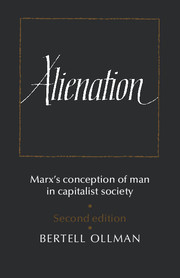Book contents
- Frontmatter
- Contents
- Preface to the second edition
- Note on translations
- Acknowledgements
- General introduction
- PART I PHILOSOPHICAL INTRODUCTION
- PART II MARX'S CONCEPTION OF HUMAN NATURE
- 7 Powers and needs
- 8 Natural man
- 9 Species man
- 10 Relating man to objects: orientation, perception
- 11 Appropriation
- 12 Nature as evidence
- 13 Activity, work, creativity
- 14 Man's social nature
- 15 The character of the species
- 16 Freedom as essence
- 17 Man, classes, people
- PART III THE THEORY OF ALIENATION
- PART IV CONCLUSION
- Appendix I In defense of the philosophy of internal relations
- Appendix II Response to my critics: more on internal relations
- Notes to the text
- Bibliography of works cited
- Index of names and ideas
- Cambridge Studies in the History and Theory of Politics
13 - Activity, work, creativity
Published online by Cambridge University Press: 05 June 2012
- Frontmatter
- Contents
- Preface to the second edition
- Note on translations
- Acknowledgements
- General introduction
- PART I PHILOSOPHICAL INTRODUCTION
- PART II MARX'S CONCEPTION OF HUMAN NATURE
- 7 Powers and needs
- 8 Natural man
- 9 Species man
- 10 Relating man to objects: orientation, perception
- 11 Appropriation
- 12 Nature as evidence
- 13 Activity, work, creativity
- 14 Man's social nature
- 15 The character of the species
- 16 Freedom as essence
- 17 Man, classes, people
- PART III THE THEORY OF ALIENATION
- PART IV CONCLUSION
- Appendix I In defense of the philosophy of internal relations
- Appendix II Response to my critics: more on internal relations
- Notes to the text
- Bibliography of works cited
- Index of names and ideas
- Cambridge Studies in the History and Theory of Politics
Summary
Activity is the chief means by which man appropriates objects. We saw earlier that perception is the individual's immediate contact with nature; orientation how he understands this contact; and appropriation – roughly – the use he makes of it. Most kinds of appropriation, however, require some ‘mediation’ to bring man's powers and nature together. Relatively few acts of appropriation are as motionless as seeing a sunset, which was the model offered. Appropriation generally demands a more active role from man himself. Activity, for Marx, is this role; it is man interacting with nature with his body as well as his mind. As such, activity is the actual movement of man's powers in the real world, the living process of objectifying these powers in nature.
The static account presented so far comes alive in man's activity. With the actors, the setting and most of the plot before us, the acting was until now missing. Change and development are now occurring, as well as provided for. It is activity which establishes man in all the areas of his life; and, for Marx, the form of this activity in any period, as with industry and appropriation itself, is indicative of the state of man's essential powers.
Just as industry predominates over all other objects in nature, so too Marx gives precedence to activity in industry over other types of activity, and for the same reasons.
- Type
- Chapter
- Information
- AlienationMarx's Conception of Man in a Capitalist Society, pp. 97 - 103Publisher: Cambridge University PressPrint publication year: 1977

